More than a decade after the March Student Movement (
With these questions in mind, directors Yang Yi-tse (
Titled the Stormy Times -- Taiwan's Student Movements (
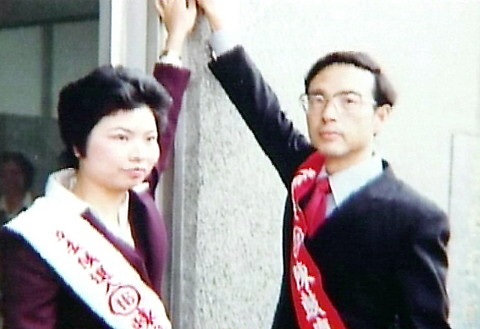
PHOTO: TAIPEI TIMES AND COURTESY OF PTS
"It was like cooking a pot of soup with stones -- a long process where you have to keep adding water and ingredients," Yang said.
A history of protests
He originally had planned to make a film about the March Student Movement featuring only Lin Chia-lung, Luo Wen-chia and Lee Wen-chung, but later broadened the time-span to almost a century, starting in the Japanese colonial period and extending to last year's post-presidential-election demonstrations.
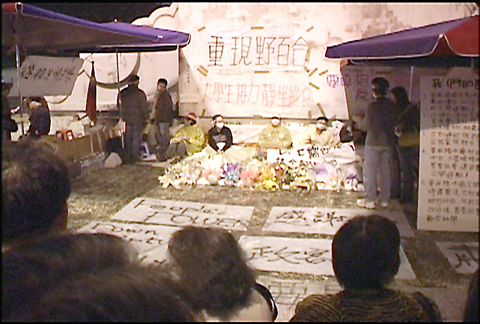
In 1910, a group of Taiwanese students studying in Japan started a publication titled Taiwan Youth (
According to Yang Tu (
"Students groups here were seeking allies with mainland Chinese student groups. Campus upheavals spread like wildfire in Taiwan and China from 1947 to 1949," Yang said at the premiere of the documentary series this week.
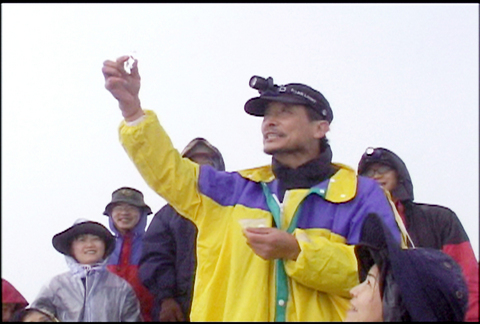
But the sprouting leftist movement was silenced by the so-called "white terror" beginning in 1950 when the ruling regime sought to consolidate its power by eradicating left-leaning dissidents through imprisonment and executions.
One of the directors of the series, Chang Chao-wei (
It wasn't until 1970, when a movement arose to defend claims to the Tiaoyutai island group, did Taiwan's campuses resume political activism. Taipei Mayor Ma Ying-jeou (馬英九), then a student at Harvard Law School, was one of the active students in the movement.
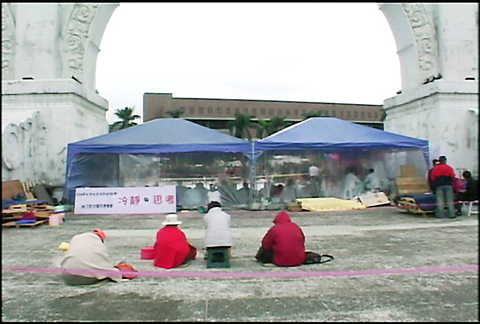
Originally a patriotic movement to back Taiwan's claim to the islands and denounce Japan's assumption of sovereignty over the uninhabited rocks in the ocean, the movement also gave voice to calls for freedom of speech and democratic reform in Taiwan.
By the 1980s, student clubs at National Taiwan University began to organize demonstrations led by Lin Chia-lung and Lee Wen-chung advocating free speech on campus.
These student clubs eventually established a united student movement with different universities culminating in the March Student Movement, which was the largest student rally in Taiwan in 20 years.
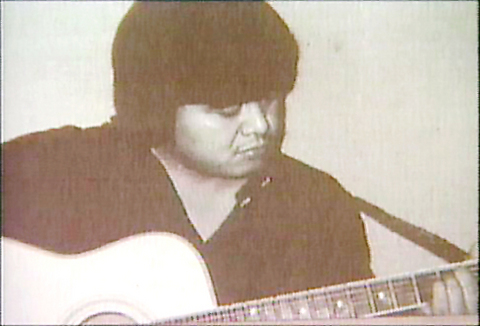
In March 1990, two college students began a demonstration to protest the National Assembly, which at that time was filled with representatives who held their posts for life. As more students joined, the protest expanded to 5,000 students and 100 professors, lasting 16 days and eventually forced a series of reforms in the legislature and National Assembly.
"We wanted to recapture the passion and spirit of those student actions and re-position those incidents in the history of Taiwan," said producer Yang.
"Many of the past incidents have been buried in each individual's memories. I am very glad to see them being discussed anew and contextualized historically," said philosophy scholar Chen Ku-ying (
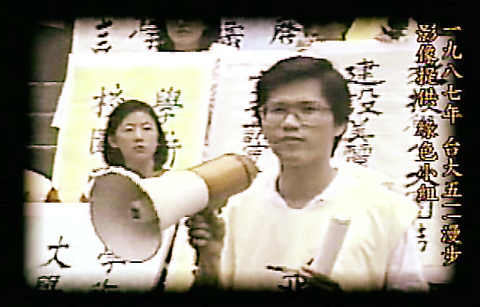
New questions
The retrospective series also stirred new questions among the former activists that speak to Taiwan's current political situation.
"Back then, we advocated the principles of science and democracy. But society now is still filled with superstition and selfish ideas," said Lin Hsiao-hsin (
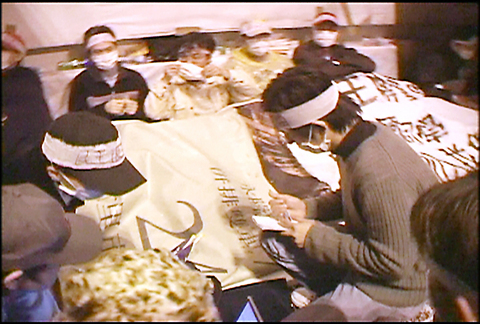
Filmmaker Chang, a participant in the March Student Movement, took the Korean student movements of the 1980s as a counterexample to Taiwan's student-led democracy movements. The former student leaders in Korea have now become the leading members of that country's government and are the key persons behind its flourishing cultural and creative industries, he said.
"But looking at Taiwan, did the March Student Movement really liberate anything? Have we really experienced a revolution?" he said.
Looking at more recent times, only sporadic student protests have taken place, and not always in support of the lofty principles of the former pro-democracy movement. Three years ago, students at National Chiao-tung University protested to demand better food and service in the campus cafeteria. Two years ago, National Cheng-kung University students gathered to protest the arrests of students for illegally downloading MP3 files.
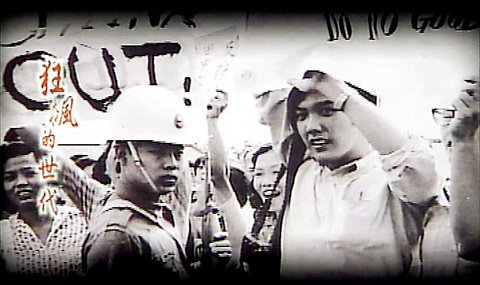
Most recently, about 100 students protested the result of last year's presidential election and what they called the suspicious circumstances of the election-eve assassination attempt on the president and vice president. But the action lost steam after 10 days.
The apparent lack of political consciousness among Taiwan's youth has given rise to the expression "Strawberry Generation" (
"Young people tend to have little concern about bigger issues in society and politics. And very few wish to run for government posts," said professor Lee Chia-tung (
The perceived indifference to politics of the Strawberry Generation worries many of the former student leaders, who say it reflects a problem in Taiwan's democraticization.
"It is not young people's fault. It's us adults who did not take the responsibility to teach them to be unselfish and to help the others," said Yang Tsu-chun (
According to Yang and Chang, the series aims to inspire reflection instead of romanticizing past student movements.
"I no longer fantasize about the next large-scale social or cultural liberation movement. But I do hope that anyone who sees the films series can look to the future by reviewing the past, not just for Taiwan, but for his or her personal life," Chang said.
`Stormy Times - Taiwan's Student Movements' is now showing on the Public Television Service channel at 10pm every Tuesday.

Taiwan has next to no political engagement in Myanmar, either with the ruling military junta nor the dozens of armed groups who’ve in the last five years taken over around two-thirds of the nation’s territory in a sprawling, patchwork civil war. But early last month, the leader of one relatively minor Burmese revolutionary faction, General Nerdah Bomya, who is also an alleged war criminal, made a low key visit to Taipei, where he met with a member of President William Lai’s (賴清德) staff, a retired Taiwanese military official and several academics. “I feel like Taiwan is a good example of

March 2 to March 8 Gunfire rang out along the shore of the frontline island of Lieyu (烈嶼) on a foggy afternoon on March 7, 1987. By the time it was over, about 20 unarmed Vietnamese refugees — men, women, elderly and children — were dead. They were hastily buried, followed by decades of silence. Months later, opposition politicians and journalists tried to uncover what had happened, but conflicting accounts only deepened the confusion. One version suggested that government troops had mistakenly killed their own operatives attempting to return home from Vietnam. The military maintained that the

Jacques Poissant’s suffering stopped the day he asked his daughter if it would be “cowardly to ask to be helped to die.” The retired Canadian insurance adviser was 93, and “was wasting away” after a long battle with prostate cancer. “He no longer had any zest for life,” Josee Poissant said. Last year her mother made the same choice at 96 when she realized she would not be getting out of hospital. She died surrounded by her children and their partners listening to the music she loved. “She was at peace. She sang until she went to sleep.” Josee Poissant remembers it as a beautiful

Before the last section of the round-the-island railway was electrified, one old blue train still chugged back and forth between Pingtung County’s Fangliao (枋寮) and Taitung (台東) stations once a day. It was so slow, was so hot (it had no air conditioning) and covered such a short distance, that the low fare still failed to attract many riders. This relic of the past was finally retired when the South Link Line was fully electrified on Dec. 23, 2020. A wave of nostalgia surrounded the termination of the Ordinary Train service, as these train carriages had been in use for decades